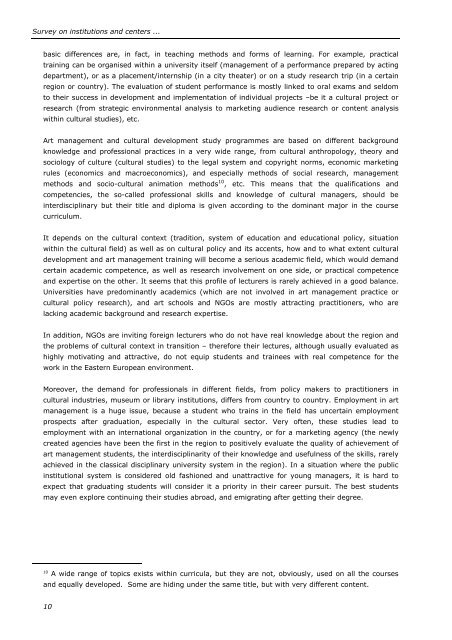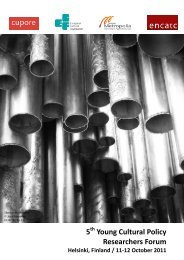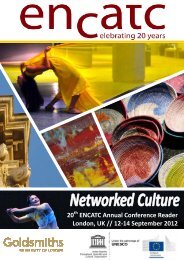Training in cultural policy and management: international ... - Encatc
Training in cultural policy and management: international ... - Encatc
Training in cultural policy and management: international ... - Encatc
You also want an ePaper? Increase the reach of your titles
YUMPU automatically turns print PDFs into web optimized ePapers that Google loves.
Survey on <strong>in</strong>stitutions <strong>and</strong> centers ...<br />
basic differences are, <strong>in</strong> fact, <strong>in</strong> teach<strong>in</strong>g methods <strong>and</strong> forms of learn<strong>in</strong>g. For example, practical<br />
tra<strong>in</strong><strong>in</strong>g can be organised with<strong>in</strong> a university itself (<strong>management</strong> of a performance prepared by act<strong>in</strong>g<br />
department), or as a placement/<strong>in</strong>ternship (<strong>in</strong> a city theater) or on a study research trip (<strong>in</strong> a certa<strong>in</strong><br />
region or country). The evaluation of student performance is mostly l<strong>in</strong>ked to oral exams <strong>and</strong> seldom<br />
to their success <strong>in</strong> development <strong>and</strong> implementation of <strong>in</strong>dividual projects –be it a <strong>cultural</strong> project or<br />
research (from strategic environmental analysis to market<strong>in</strong>g audience research or content analysis<br />
with<strong>in</strong> <strong>cultural</strong> studies), etc.<br />
Art <strong>management</strong> <strong>and</strong> <strong>cultural</strong> development study programmes are based on different background<br />
knowledge <strong>and</strong> professional practices <strong>in</strong> a very wide range, from <strong>cultural</strong> anthropology, theory <strong>and</strong><br />
sociology of culture (<strong>cultural</strong> studies) to the legal system <strong>and</strong> copyright norms, economic market<strong>in</strong>g<br />
rules (economics <strong>and</strong> macroeconomics), <strong>and</strong> especially methods of social research, <strong>management</strong><br />
methods <strong>and</strong> socio-<strong>cultural</strong> animation methods 10 , etc. This means that the qualifications <strong>and</strong><br />
competencies, the so-called professional skills <strong>and</strong> knowledge of <strong>cultural</strong> managers, should be<br />
<strong>in</strong>terdiscipl<strong>in</strong>ary but their title <strong>and</strong> diploma is given accord<strong>in</strong>g to the dom<strong>in</strong>ant major <strong>in</strong> the course<br />
curriculum.<br />
It depends on the <strong>cultural</strong> context (tradition, system of education <strong>and</strong> educational <strong>policy</strong>, situation<br />
with<strong>in</strong> the <strong>cultural</strong> field) as well as on <strong>cultural</strong> <strong>policy</strong> <strong>and</strong> its accents, how <strong>and</strong> to what extent <strong>cultural</strong><br />
development <strong>and</strong> art <strong>management</strong> tra<strong>in</strong><strong>in</strong>g will become a serious academic field, which would dem<strong>and</strong><br />
certa<strong>in</strong> academic competence, as well as research <strong>in</strong>volvement on one side, or practical competence<br />
<strong>and</strong> expertise on the other. It seems that this profile of lecturers is rarely achieved <strong>in</strong> a good balance.<br />
Universities have predom<strong>in</strong>antly academics (which are not <strong>in</strong>volved <strong>in</strong> art <strong>management</strong> practice or<br />
<strong>cultural</strong> <strong>policy</strong> research), <strong>and</strong> art schools <strong>and</strong> NGOs are mostly attract<strong>in</strong>g practitioners, who are<br />
lack<strong>in</strong>g academic background <strong>and</strong> research expertise.<br />
In addition, NGOs are <strong>in</strong>vit<strong>in</strong>g foreign lecturers who do not have real knowledge about the region <strong>and</strong><br />
the problems of <strong>cultural</strong> context <strong>in</strong> transition – therefore their lectures, although usually evaluated as<br />
highly motivat<strong>in</strong>g <strong>and</strong> attractive, do not equip students <strong>and</strong> tra<strong>in</strong>ees with real competence for the<br />
work <strong>in</strong> the Eastern European environment.<br />
Moreover, the dem<strong>and</strong> for professionals <strong>in</strong> different fields, from <strong>policy</strong> makers to practitioners <strong>in</strong><br />
<strong>cultural</strong> <strong>in</strong>dustries, museum or library <strong>in</strong>stitutions, differs from country to country. Employment <strong>in</strong> art<br />
<strong>management</strong> is a huge issue, because a student who tra<strong>in</strong>s <strong>in</strong> the field has uncerta<strong>in</strong> employment<br />
prospects after graduation, especially <strong>in</strong> the <strong>cultural</strong> sector. Very often, these studies lead to<br />
employment with an <strong>in</strong>ternational organization <strong>in</strong> the country, or for a market<strong>in</strong>g agency (the newly<br />
created agencies have been the first <strong>in</strong> the region to positively evaluate the quality of achievement of<br />
art <strong>management</strong> students, the <strong>in</strong>terdiscipl<strong>in</strong>arity of their knowledge <strong>and</strong> usefulness of the skills, rarely<br />
achieved <strong>in</strong> the classical discipl<strong>in</strong>ary university system <strong>in</strong> the region). In a situation where the public<br />
<strong>in</strong>stitutional system is considered old fashioned <strong>and</strong> unattractive for young managers, it is hard to<br />
expect that graduat<strong>in</strong>g students will consider it a priority <strong>in</strong> their career pursuit. The best students<br />
may even explore cont<strong>in</strong>u<strong>in</strong>g their studies abroad, <strong>and</strong> emigrat<strong>in</strong>g after gett<strong>in</strong>g their degree.<br />
10 A wide range of topics exists with<strong>in</strong> curricula, but they are not, obviously, used on all the courses<br />
<strong>and</strong> equally developed. Some are hid<strong>in</strong>g under the same title, but with very different content.<br />
10






